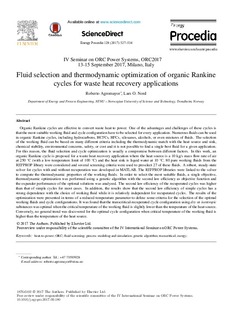| dc.contributor.author | Agromayor, Roberto | |
| dc.contributor.author | Nord, Lars O. | |
| dc.date.accessioned | 2017-12-05T09:32:32Z | |
| dc.date.available | 2017-12-05T09:32:32Z | |
| dc.date.created | 2017-09-20T15:55:04Z | |
| dc.date.issued | 2017 | |
| dc.identifier.citation | Energy Procedia. 2017, 129 527-534. | nb_NO |
| dc.identifier.issn | 1876-6102 | |
| dc.identifier.uri | http://hdl.handle.net/11250/2469205 | |
| dc.description.abstract | Organic Rankine cycles are effective to convert waste heat to power. One of the advantages and challenges of these cycles is that the most suitable working fluid and cycle configuration have to be selected for every application. Numerous fluids can be used in organic Rankine cycles, including hydrocarbons, HCFCs, HFCs, siloxanes, alcohols, or even mixtures of fluids. The selection of the working fluid can be based on many different criteria including the thermodynamic match with the heat source and sink, chemical stability, environmental concerns, safety, or cost and it is not possible to find a single best fluid for a given application. For this reason, the fluid selection and cycle optimization is usually a compromise between different factors. In this work, an organic Rankine cycle is proposed for a waste heat recovery application where the heat source is a 10 kg/s mass flow rate of air at 250 °C (with a low temperature limit of 100 °C) and the heat sink is liquid water at 10 °C. 80 pure working fluids from the REFPROP library were considered and several screening criteria were used to preselect 27 of these fluids. A robust, steady-state solver for cycles with and without recuperation was developed in MATLAB. The REFPROP libraries were linked to the solver to compute the thermodynamic properties of the working fluids. In order to select the most suitable fluids, a single objective, thermodynamic optimization was performed using a genetic algorithm with the second law efficiency as objective function and the expander performance of the optimal solutions was analyzed. The second law efficiency of the recuperated cycles was higher than that of simple cycles for most cases. In addition, the results show that the second law efficiency of simple cycles has a strong dependence with the choice of working fluid while it is relatively independent for recuperated cycles. The results of the optimization were presented in terms of a reduced temperature parameter to define some criteria for the selection of the optimal working fluids and cycle configurations. It was found that the transcritical-recuperated cycle configuration using dry or isentropic substances was optimal when the critical temperature of the working fluid is slightly lower than the temperature of the heat source. Conversely, no general trend was discovered for the optimal cycle configuration when critical temperature of the working fluid is higher than the temperature of the heat source. | nb_NO |
| dc.language.iso | eng | nb_NO |
| dc.publisher | Elsevier | nb_NO |
| dc.rights | Attribution-NonCommercial-NoDerivatives 4.0 Internasjonal | * |
| dc.rights.uri | http://creativecommons.org/licenses/by-nc-nd/4.0/deed.no | * |
| dc.title | Fluid selection and thermodynamic optimization of organic Rankine cycles for waste heat recovery applications | nb_NO |
| dc.type | Journal article | nb_NO |
| dc.type | Peer reviewed | nb_NO |
| dc.description.version | publishedVersion | nb_NO |
| dc.source.pagenumber | 527-534 | nb_NO |
| dc.source.volume | 129 | nb_NO |
| dc.source.journal | Energy Procedia | nb_NO |
| dc.identifier.doi | 10.1016/j.egypro.2017.09.180 | |
| dc.identifier.cristin | 1495940 | |
| dc.relation.project | Norges forskningsråd: 255016 | nb_NO |
| dc.description.localcode | © 2017 The Authors. Published by Elsevier Ltd. This is an open access article under the CC-BY-NC-ND 4.0 license (http://creativecommons.org/licenses/by-nc-nd/4.0/) | nb_NO |
| cristin.unitcode | 194,64,25,0 | |
| cristin.unitname | Institutt for energi- og prosessteknikk | |
| cristin.ispublished | true | |
| cristin.fulltext | original | |
| cristin.qualitycode | 1 | |

